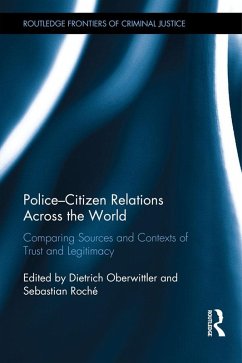Police-Citizen Relations Across the World (eBook, ePUB)
Comparing sources and contexts of trust and legitimacy
Redaktion: Oberwittler, Dietrich; Roché, Sebastian
46,95 €
46,95 €
inkl. MwSt.
Sofort per Download lieferbar

23 °P sammeln
46,95 €
Als Download kaufen

46,95 €
inkl. MwSt.
Sofort per Download lieferbar

23 °P sammeln
Jetzt verschenken
Alle Infos zum eBook verschenken
46,95 €
inkl. MwSt.
Sofort per Download lieferbar
Alle Infos zum eBook verschenken

23 °P sammeln
Police-Citizen Relations Across the World (eBook, ePUB)
Comparing sources and contexts of trust and legitimacy
Redaktion: Oberwittler, Dietrich; Roché, Sebastian
- Format: ePub
- Merkliste
- Auf die Merkliste
- Bewerten Bewerten
- Teilen
- Produkt teilen
- Produkterinnerung
- Produkterinnerung

Bitte loggen Sie sich zunächst in Ihr Kundenkonto ein oder registrieren Sie sich bei
bücher.de, um das eBook-Abo tolino select nutzen zu können.
Hier können Sie sich einloggen
Hier können Sie sich einloggen
Sie sind bereits eingeloggt. Klicken Sie auf 2. tolino select Abo, um fortzufahren.

Bitte loggen Sie sich zunächst in Ihr Kundenkonto ein oder registrieren Sie sich bei bücher.de, um das eBook-Abo tolino select nutzen zu können.
This book considers questions of police legitimacy in different regions of the world, explores the perception of legitimacy and examines how procedural justice is important for building legitimacy.
- Geräte: eReader
- mit Kopierschutz
- eBook Hilfe
- Größe: 7.26MB
Andere Kunden interessierten sich auch für
![Stop and Search and Police Legitimacy (eBook, ePUB) Stop and Search and Police Legitimacy (eBook, ePUB)]() Ben BradfordStop and Search and Police Legitimacy (eBook, ePUB)46,95 €
Ben BradfordStop and Search and Police Legitimacy (eBook, ePUB)46,95 €![Restorative Policing (eBook, ePUB) Restorative Policing (eBook, ePUB)]() Kerry ClampRestorative Policing (eBook, ePUB)49,95 €
Kerry ClampRestorative Policing (eBook, ePUB)49,95 €![Moral Issues in Intelligence-led Policing (eBook, ePUB) Moral Issues in Intelligence-led Policing (eBook, ePUB)]() Moral Issues in Intelligence-led Policing (eBook, ePUB)46,95 €
Moral Issues in Intelligence-led Policing (eBook, ePUB)46,95 €![The Law Officer's Pocket Manual (eBook, ePUB) The Law Officer's Pocket Manual (eBook, ePUB)]() John G. Miles Jr.The Law Officer's Pocket Manual (eBook, ePUB)31,95 €
John G. Miles Jr.The Law Officer's Pocket Manual (eBook, ePUB)31,95 €![Police-Citizen Relations Across the World (eBook, PDF) Police-Citizen Relations Across the World (eBook, PDF)]() Police-Citizen Relations Across the World (eBook, PDF)46,95 €
Police-Citizen Relations Across the World (eBook, PDF)46,95 €![Police Corruption (eBook, ePUB) Police Corruption (eBook, ePUB)]() Tim PrenzlerPolice Corruption (eBook, ePUB)48,95 €
Tim PrenzlerPolice Corruption (eBook, ePUB)48,95 €![Policing in France (eBook, ePUB) Policing in France (eBook, ePUB)]() Policing in France (eBook, ePUB)63,95 €
Policing in France (eBook, ePUB)63,95 €-
-
-
This book considers questions of police legitimacy in different regions of the world, explores the perception of legitimacy and examines how procedural justice is important for building legitimacy.
Dieser Download kann aus rechtlichen Gründen nur mit Rechnungsadresse in A, B, BG, CY, CZ, D, DK, EW, E, FIN, F, GR, HR, H, IRL, I, LT, L, LR, M, NL, PL, P, R, S, SLO, SK ausgeliefert werden.
Produktdetails
- Produktdetails
- Verlag: Taylor & Francis eBooks
- Seitenzahl: 332
- Erscheinungstermin: 2. Oktober 2017
- Englisch
- ISBN-13: 9781315406640
- Artikelnr.: 49984939
- Verlag: Taylor & Francis eBooks
- Seitenzahl: 332
- Erscheinungstermin: 2. Oktober 2017
- Englisch
- ISBN-13: 9781315406640
- Artikelnr.: 49984939
- Herstellerkennzeichnung Die Herstellerinformationen sind derzeit nicht verfügbar.
Dietrich Oberwittler is a senior researcher at the Max Planck Institute for International and Foreign Criminal Law (Department of Criminology) in Freiburg, Germany, and extracurricular professor of sociology at the University of Freiburg. Sebastian Roché is a Research Professor at the National Center for Scientific Research (CNRS) at Sciences-Po, University of Grenoble-Alpes, France. First secretary general of the European Society of Criminology after its foundation, he is today the regional editor (Europe) of Policing and Society.
Foreword
Michal Tonry
Part I: Introduction. 1. Towards a broader view of police-citizen relations: How societal cleavages and political contexts shape trust and distrust
legitimacy and illegitimacy
Sebastian Roché and Dietrich Oberwittler
Part II: Police-citizen relations. Multilevel and comparative approaches: Neighbourhoods and states. 2. Recent trends in police-citizen relations and police reform in the United States
Ronald Weitzer
3. Ethnicity
group position and police legitimacy: Early findings from the European Social Survey
Ben Bradford
Jonathan Jackson and Mike Hough
4. Ethnic disparities in police-initiated controls of adolescents and attitudes towards the police in France and Germany: A tale of four cities
Dietrich Oberwittler and Sebastian Roché
5. Police legitimacy and public cooperation: Is Japan an outlier in the procedural justice model? Mai Sato
6. Why do Nigerians cooperate with the police? Legitimacy
procedural justice
and other contextual factors in Nigeria
Oluwagbenga Michael Akinlabi
Part III: Societal cleavages and legitimacy: Minorities and religions. 7. Policing marginalized groups in a diverse society: Using procedural justice to promote group belongingness and trust in police
Kristina Murphy and Adrian Cherney
8. Adolescents' divergent ethnic and religious identities and trust in the police. Combining micro- and macro-level determinants in a comparative analysis in France and Germany
Sebastian Roché
Anina Schwarzenbach
Dietrich Oberwittler and Jacques De Maillard
9. The impact of the Ferguson
MO police shooting on black and non-black residents' perceptions of police. Procedural justice
trust
and legitimacy
Tammy Rinehart Kochel
10. Why may police disobey the law? How divisions in society are a source of the moral right to do bad: the case of Turkey
Sebastian Roché
Mine Özäç¿lar and Ömer Bilen
Part IV: Procedural justice as cause and consequence. 11. Stop-and-Frisk and trust in police in Chicago
Wesley G. Skogan
12. Good cops
bad cops: Why do police officers treat citizens (dis)respectfully? Findings from Belgium
Maarten Van Craen
Stephan Parmentier and Mina Rauschenbach
13. Trust in the Finnish police and crime reporting-findings in the context of the Nordic countries
Juha Kääriäinen
Michal Tonry
Part I: Introduction. 1. Towards a broader view of police-citizen relations: How societal cleavages and political contexts shape trust and distrust
legitimacy and illegitimacy
Sebastian Roché and Dietrich Oberwittler
Part II: Police-citizen relations. Multilevel and comparative approaches: Neighbourhoods and states. 2. Recent trends in police-citizen relations and police reform in the United States
Ronald Weitzer
3. Ethnicity
group position and police legitimacy: Early findings from the European Social Survey
Ben Bradford
Jonathan Jackson and Mike Hough
4. Ethnic disparities in police-initiated controls of adolescents and attitudes towards the police in France and Germany: A tale of four cities
Dietrich Oberwittler and Sebastian Roché
5. Police legitimacy and public cooperation: Is Japan an outlier in the procedural justice model? Mai Sato
6. Why do Nigerians cooperate with the police? Legitimacy
procedural justice
and other contextual factors in Nigeria
Oluwagbenga Michael Akinlabi
Part III: Societal cleavages and legitimacy: Minorities and religions. 7. Policing marginalized groups in a diverse society: Using procedural justice to promote group belongingness and trust in police
Kristina Murphy and Adrian Cherney
8. Adolescents' divergent ethnic and religious identities and trust in the police. Combining micro- and macro-level determinants in a comparative analysis in France and Germany
Sebastian Roché
Anina Schwarzenbach
Dietrich Oberwittler and Jacques De Maillard
9. The impact of the Ferguson
MO police shooting on black and non-black residents' perceptions of police. Procedural justice
trust
and legitimacy
Tammy Rinehart Kochel
10. Why may police disobey the law? How divisions in society are a source of the moral right to do bad: the case of Turkey
Sebastian Roché
Mine Özäç¿lar and Ömer Bilen
Part IV: Procedural justice as cause and consequence. 11. Stop-and-Frisk and trust in police in Chicago
Wesley G. Skogan
12. Good cops
bad cops: Why do police officers treat citizens (dis)respectfully? Findings from Belgium
Maarten Van Craen
Stephan Parmentier and Mina Rauschenbach
13. Trust in the Finnish police and crime reporting-findings in the context of the Nordic countries
Juha Kääriäinen
Foreword
Michal Tonry
Part I: Introduction. 1. Towards a broader view of police-citizen relations: How societal cleavages and political contexts shape trust and distrust
legitimacy and illegitimacy
Sebastian Roché and Dietrich Oberwittler
Part II: Police-citizen relations. Multilevel and comparative approaches: Neighbourhoods and states. 2. Recent trends in police-citizen relations and police reform in the United States
Ronald Weitzer
3. Ethnicity
group position and police legitimacy: Early findings from the European Social Survey
Ben Bradford
Jonathan Jackson and Mike Hough
4. Ethnic disparities in police-initiated controls of adolescents and attitudes towards the police in France and Germany: A tale of four cities
Dietrich Oberwittler and Sebastian Roché
5. Police legitimacy and public cooperation: Is Japan an outlier in the procedural justice model? Mai Sato
6. Why do Nigerians cooperate with the police? Legitimacy
procedural justice
and other contextual factors in Nigeria
Oluwagbenga Michael Akinlabi
Part III: Societal cleavages and legitimacy: Minorities and religions. 7. Policing marginalized groups in a diverse society: Using procedural justice to promote group belongingness and trust in police
Kristina Murphy and Adrian Cherney
8. Adolescents' divergent ethnic and religious identities and trust in the police. Combining micro- and macro-level determinants in a comparative analysis in France and Germany
Sebastian Roché
Anina Schwarzenbach
Dietrich Oberwittler and Jacques De Maillard
9. The impact of the Ferguson
MO police shooting on black and non-black residents' perceptions of police. Procedural justice
trust
and legitimacy
Tammy Rinehart Kochel
10. Why may police disobey the law? How divisions in society are a source of the moral right to do bad: the case of Turkey
Sebastian Roché
Mine Özäç¿lar and Ömer Bilen
Part IV: Procedural justice as cause and consequence. 11. Stop-and-Frisk and trust in police in Chicago
Wesley G. Skogan
12. Good cops
bad cops: Why do police officers treat citizens (dis)respectfully? Findings from Belgium
Maarten Van Craen
Stephan Parmentier and Mina Rauschenbach
13. Trust in the Finnish police and crime reporting-findings in the context of the Nordic countries
Juha Kääriäinen
Michal Tonry
Part I: Introduction. 1. Towards a broader view of police-citizen relations: How societal cleavages and political contexts shape trust and distrust
legitimacy and illegitimacy
Sebastian Roché and Dietrich Oberwittler
Part II: Police-citizen relations. Multilevel and comparative approaches: Neighbourhoods and states. 2. Recent trends in police-citizen relations and police reform in the United States
Ronald Weitzer
3. Ethnicity
group position and police legitimacy: Early findings from the European Social Survey
Ben Bradford
Jonathan Jackson and Mike Hough
4. Ethnic disparities in police-initiated controls of adolescents and attitudes towards the police in France and Germany: A tale of four cities
Dietrich Oberwittler and Sebastian Roché
5. Police legitimacy and public cooperation: Is Japan an outlier in the procedural justice model? Mai Sato
6. Why do Nigerians cooperate with the police? Legitimacy
procedural justice
and other contextual factors in Nigeria
Oluwagbenga Michael Akinlabi
Part III: Societal cleavages and legitimacy: Minorities and religions. 7. Policing marginalized groups in a diverse society: Using procedural justice to promote group belongingness and trust in police
Kristina Murphy and Adrian Cherney
8. Adolescents' divergent ethnic and religious identities and trust in the police. Combining micro- and macro-level determinants in a comparative analysis in France and Germany
Sebastian Roché
Anina Schwarzenbach
Dietrich Oberwittler and Jacques De Maillard
9. The impact of the Ferguson
MO police shooting on black and non-black residents' perceptions of police. Procedural justice
trust
and legitimacy
Tammy Rinehart Kochel
10. Why may police disobey the law? How divisions in society are a source of the moral right to do bad: the case of Turkey
Sebastian Roché
Mine Özäç¿lar and Ömer Bilen
Part IV: Procedural justice as cause and consequence. 11. Stop-and-Frisk and trust in police in Chicago
Wesley G. Skogan
12. Good cops
bad cops: Why do police officers treat citizens (dis)respectfully? Findings from Belgium
Maarten Van Craen
Stephan Parmentier and Mina Rauschenbach
13. Trust in the Finnish police and crime reporting-findings in the context of the Nordic countries
Juha Kääriäinen







